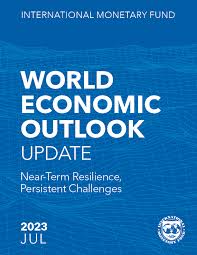The World Economic Outlook Report: A Comprehensive Analysis
The World Economic Outlook (WEO) report, published by the International Monetary Fund (IMF), serves as a crucial tool for understanding the global economic landscape. This biannual report provides in-depth analysis and forecasts on key economic indicators, offering insights into trends, challenges, and opportunities shaping the world economy.
Key Highlights from the Latest Report
The most recent WEO report highlights several key trends that are influencing the global economy:
- Economic Growth: The report projects a moderate but uneven recovery in global economic growth, with advanced economies leading the way while emerging markets face challenges.
- Inflation: Inflation rates are expected to vary across regions, influenced by factors such as supply chain disruptions and changing consumer behaviour.
- Trade and Investment: Global trade and investment flows continue to face uncertainties due to geopolitical tensions and shifting trade policies.
- Labour Market: Employment levels are recovering at different paces globally, with disparities in job creation and wage growth.
Policy Recommendations
Based on its analysis, the WEO report offers policy recommendations to policymakers around the world. These recommendations aim to support sustainable economic growth, address income inequality, enhance financial stability, and promote inclusive development.
Challenges Ahead
While the global economy shows signs of resilience, it also faces significant challenges. These challenges include climate change impacts, rising debt levels in some countries, technological disruptions affecting labour markets, and uncertainties surrounding international cooperation.
In Conclusion
The World Economic Outlook report provides a comprehensive overview of the state of the global economy and offers valuable insights for decision-makers in government, business, and academia. By staying informed about key economic trends and risks outlined in this report, stakeholders can better navigate an increasingly complex and interconnected world economy.
For more detailed information on the latest World Economic Outlook report, visit the IMF’s official website.
5 Essential Tips for Navigating the World Economic Outlook Report
- Stay informed about global economic trends and forecasts.
- Understand the impact of geopolitical events on the world economy.
- Monitor key indicators such as GDP growth, inflation rates, and unemployment levels.
- Diversify investments to mitigate risks in a volatile economic environment.
- Consider long-term implications of economic policies and decisions on your financial strategy.
Stay informed about global economic trends and forecasts.
Staying informed about global economic trends and forecasts is essential for individuals, businesses, and policymakers to make informed decisions in an ever-changing economic landscape. By keeping abreast of the insights provided in reports such as the World Economic Outlook, one can gain valuable knowledge about emerging opportunities, potential risks, and the overall health of the global economy. This proactive approach to staying informed enables stakeholders to anticipate market shifts, adapt strategies accordingly, and position themselves for success in a dynamic and interconnected world economy.
Understand the impact of geopolitical events on the world economy.
Understanding the impact of geopolitical events on the world economy is crucial for gaining insights into the interconnected nature of global markets. Geopolitical events, such as trade disputes, political unrest, and international conflicts, can have far-reaching implications on economic stability, investment patterns, and market confidence. By analysing how these events influence trade flows, commodity prices, and investor sentiment, policymakers and businesses can better anticipate risks and opportunities in an ever-evolving economic landscape. A nuanced understanding of the relationship between geopolitics and the world economy is essential for making informed decisions that can mitigate risks and foster sustainable growth on a global scale.
Monitor key indicators such as GDP growth, inflation rates, and unemployment levels.
To navigate the ever-evolving global economic landscape effectively, it is crucial to monitor key indicators such as GDP growth, inflation rates, and unemployment levels. These metrics serve as vital barometers of economic health, providing valuable insights into the overall stability and performance of economies worldwide. By keeping a close eye on these indicators, policymakers, investors, and businesses can make informed decisions, anticipate trends, and proactively respond to challenges and opportunities in the dynamic world economy.
Diversify investments to mitigate risks in a volatile economic environment.
In light of the insights from the World Economic Outlook report, a prudent tip for investors is to diversify their investments as a strategy to mitigate risks in a volatile economic environment. By spreading investments across different asset classes, industries, and geographical regions, investors can reduce their exposure to any single risk factor and potentially enhance their portfolio’s resilience to market fluctuations. Diversification is a fundamental principle that can help investors navigate uncertainties and achieve more stable long-term returns in the ever-evolving global economic landscape.
Consider long-term implications of economic policies and decisions on your financial strategy.
When delving into the insights provided by the World Economic Outlook report, it is essential to heed the advice of considering the long-term implications of economic policies and decisions on your financial strategy. By assessing how global economic trends and policy changes may impact your financial outlook in the future, you can make more informed decisions about investments, savings, and overall financial planning. Understanding the interconnected nature of the world economy and its potential effects on your personal finances can help you adapt proactively to changing circumstances and safeguard your financial well-being in the long run.

